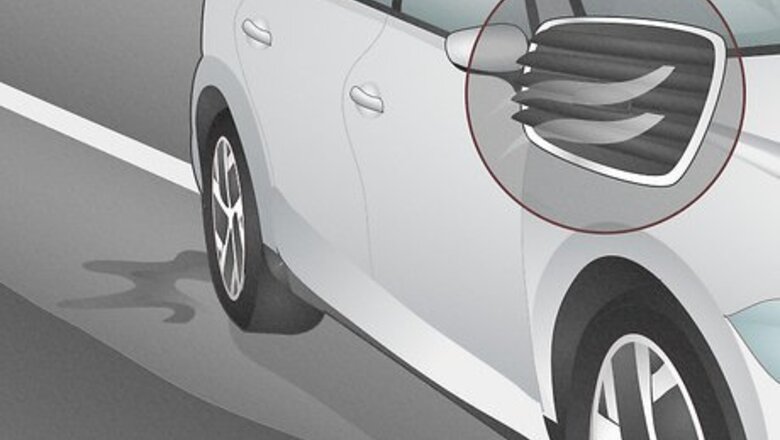
views
- It’s normal for your vehicle to drip water if you run air conditioning on hot days, as the AC creates condensation.
- If it’s not hot out or you aren’t running air conditioning, your vehicle is leaking a liquid other than water.
- To figure out what fluid your car is leaking, inspect the color and odor to determine what the liquid might be.
Why is my vehicle dripping water?
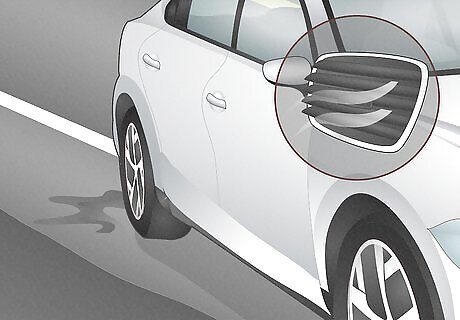
Your AC is running and it’s producing condensation. If it’s hot out and you’re running the air conditioning in your car, it’s going to produce condensation as the hot air outside meets the freezing temps at the condenser. This water travels down a drainage pipe that lets it out towards the back of your vehicle, usually on the passenger’s side. Have you ever left a cold water bottle on a table on a hot day and come back to pick it up later only to find water all over your hands from the bottle? That’s basically what’s happening with your car. The longer you drive and the hotter it is outside, the more water you’re going to see underneath your car. This is totally normal.
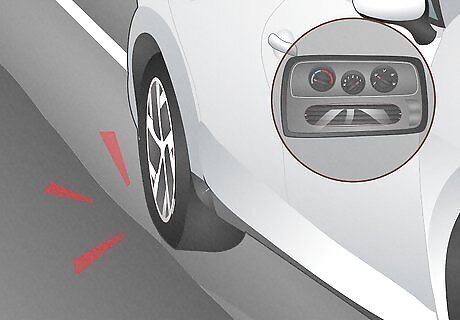
If you don’t see water while running the AC, it’s a problem. The fact that your vehicle is dripping water when it’s hot out is a good thing. Air conditioning running in hot air is going to produce condensation—there are no ifs ands or buts there—so if the choice is water spilling onto the ground or somewhere else in your car, the ground is the optimal option. If you ever run the AC and find water pooling up behind the driver’s seat or under the gas pedal, it’s a sign the drainage hose is blocked. See a mechanic to get your AC condensation lines cleaned and flushed.
What if I’m not running AC?
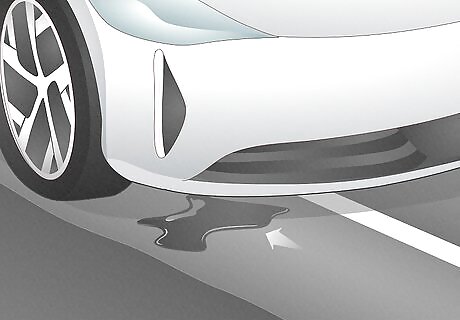
Then it’s not water—you’re leaking some other liquid. There is no water in your car. What we mean is, that there’s no rail, line, or component that contains water. So, if you aren’t running the air conditioning and there’s liquid pooling up under your car, it fundamentally cannot be water. This isn’t normal, and it’s something that requires immediate investigation.
Identifying Vehicle Leaks
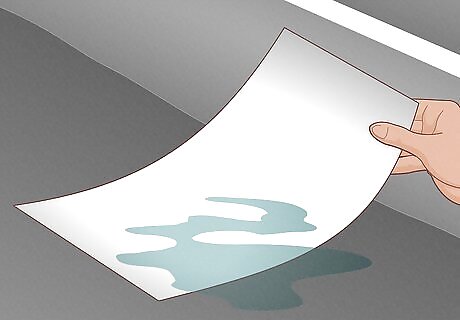
Put a piece of white paper on the spill to see what color it is. Move your vehicle so that you can easily access the spill. You don’t need much, so don’t worry if there’s only a few drops. Grab a blank piece of bright white printer paper and lay it over the spill. If there are only a few drops and the paper absorbs nothing on its own, press gently on the paper. Inspect the paper to see what color it is. The color of the fluid determines what it is, as the colors for vehicle liquids tend to be functionally universal.
Vehicle Fluid Colors & Odors
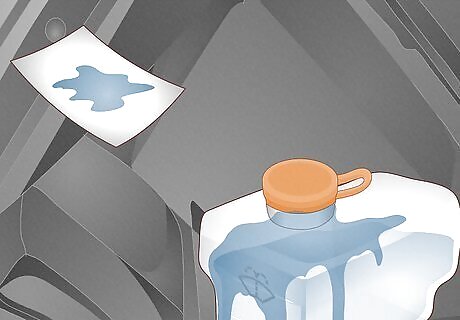
Blue This is windshield wiper fluid. The reservoir holding all of the wiper fluid is probably cracked or damaged, although it’s possible that the line leading up to the wipers is leaking. What does it smell like? Windshield wiper fluid smells chemically. To a lot of folks, it’s comparable to ammonia. How big of a problem is this? It’s a problem, but not an outright emergency. You need to be able to clear your windshield if it gets too dirty to see out of or if it rains. However, if it’s clear out right now, you’re okay. What should I do about it? See a mechanic soon to get the reservoir patched or replaced.
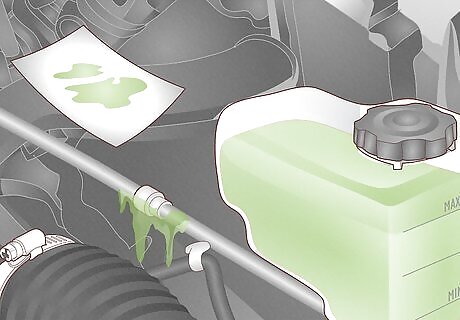
Green This is most likely coolant. As a note, some coolants are red or orange, so check the color of your coolant reservoir to confirm. The coolant pump is likely bad, although there could be a leak elsewhere in a coolant line. What does it smell like? If you smell something sweet or slightly nutty, it’s 100% coolant. How big of a problem is this? Without coolant, your engine won’t be able to disperse the heat it generates, which could cause catastrophic damage to the engine if it isn’t cold out. What should I do about it? If it’s freezing outside or your engine isn’t running hot, drive slowly to the nearest mechanic. If the engine is running hot, get the vehicle towed to a mechanic. EXPERT TIP Hovig Manouchekian Hovig Manouchekian Auto Repair & Design Specialist Hovig Manouchekian is an Auto Repair and Design Specialist and the Manager of Funk Brothers Auto, a family-owned business operated since 1925. With over 30 years of experience in the automotive industry, Hovig specializes in the process of auto repair and maintenance. He is also very knowledgeable in common automotive issues and needs including engine repair, battery replacement, and windshield accessory and maintenance. Hovig's knowledge and hard work have contributed to Funk Brothers Auto winning Angie's List Super Service Award for five consecutive years. Hovig Manouchekian Hovig Manouchekian Auto Repair & Design Specialist Act immediately if there is coolant in your transmission. Flush the transmission fluid immediately to remove contamination. Identify the leak source and see a mechanic for diagnosis and repair. Ignoring this can destroy your transmission.
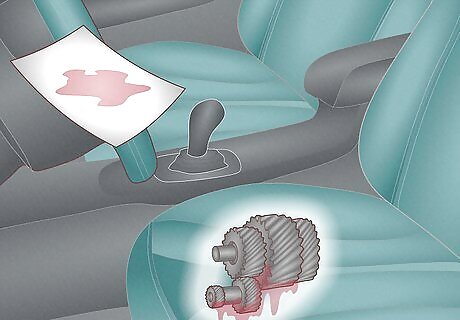
Pink or Red This is power steering fluid or transmission fluid. Your power steering pump may be bad, or there could be some underlying damage to your transmission. Narrow it down by looking at the symptoms. Is it harder to corner than it normally is? If so, it’s your power steering fluid. Are you having trouble shifting gears? If so, it’s transmission fluid. What does it smell like? Power steering fluid has a fishy odor. Sometimes, it smells a touch like burnt marshmallows. Transmission fluid smells sugary. How big of a problem is this? It’s concerning, but you’re okay to drive to the mechanic if you aren’t experiencing any symptoms behind the wheel. What should I do about it? Go to a mechanic to have the problem inspected. However, if you’re experiencing any kind of trouble behind the wheel, don’t push it. Get a tow to the mechanic.
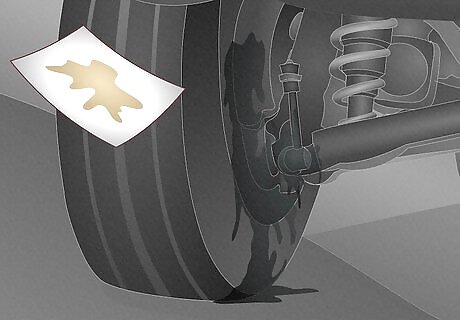
Yellow This is brake fluid. Brake fluid also tends to be oily, so that’s another sign if you’re looking for one. Your brake pedal is connected to the brake pads via a hydraulic system. When you press the pedal, the brake fluid pressurizes and pushes the brake pads down into the rotors. If your brake lines are damaged, that fluid may leak out. What does it smell like? Brake fluid smells oily with some fishy undernotes. How big of a problem is this? It’s a big enough problem that you cannot drive with this leak. If your brake fluid runs low enough, you won’t be able to stop the car. What should I do about it? Pull over and get a tow to a mechanic.
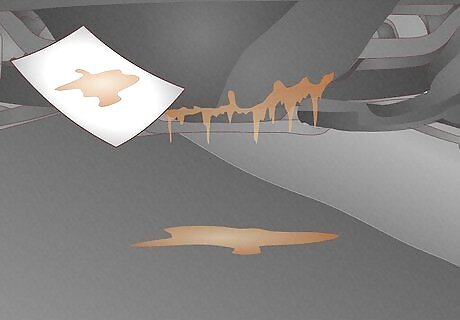
Orange This is probably radiator fluid, although it could be transmission coolant. It’s sort of irrelevant which one it happens to be though, since they both perform the same basic function: cooling your vehicle down. It’s rare these systems experience leaks from just driving around—you likely have some kind of damage to your engine or transmission. What does it smell like? Radiator fluid often smells a little sweet, although it may be more on the odorless side—especially if it’s new. How big of a problem is this? It’s important to avoid driving if your engine is running hotter than it should be. What should I do about it? If there’s no overheating, drive to the mechanic now. If you’re having any heating issues, pull over and get a tow to the repair shop.
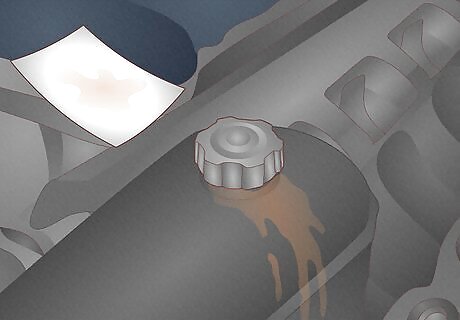
Light brown This is probably fresh engine oil. If you’ve just refilled the engine oil, or you’ve had an oil change, the light brown fluid droplets are probably just spills. It could also be gear lubricant, although that’s extremely unlikely unless you just lubricated something yourself and you overdid it. What does it smell like? Fresh engine oil smells like a combination of plastic, gasoline, and sulfur. How big of a problem is this? Not the end of the world. Wipe up any spills in your engine bay and wait for the residual oil to dry. What should I do about it? You may smell a slight burning odor the next time you start your vehicle. If that goes away near-instantly, you don’t need to do anything. If it doesn’t, turn the vehicle off and get a tow to a mechanic. You may have a leak you haven’t found.
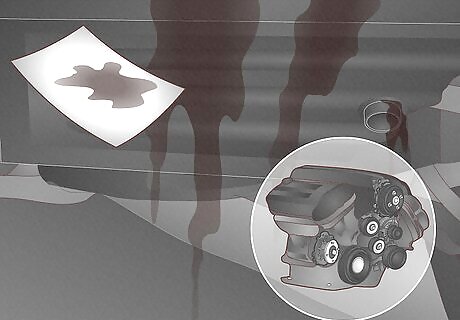
Dark brown This is used engine oil, which means you’ve got an oil leak somewhere. The engine oil flows through your engine and helps keep the gears and components lubricated as they churn and rotate. If your engine is damaged or you don’t change the oil regularly enough, those gears and components will create friction which will lead to further damage. What does it smell like? Spent or used engine oil has a burnt aroma to it. How big of a problem is this? This one is potentially dangerous. Engine oil is flammable, so your car could catch fire if there’s an active leak. On top of that, your engine is experiencing serious wear and tear if it doesn’t have enough oil. What should I do about it? Get a tow to a mechanic. It’s dangerous to work with spent engine oil on your own.




















Comments
0 comment